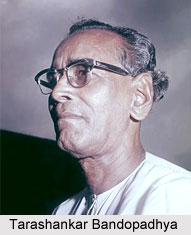 Tarashankar Bandopadhay represented the Kallol group who were characterised by bohemian outlook and fearless embankment in their venture towards the realistic exposition of human relationships. He is the one who grouped with those writers of the third decades of the 20th century who broke the poetic tradition in novels but took to writing prose with the world around them adding romance to human relationship breaking the indifference of the so called conservative people of the society.
Tarashankar Bandopadhay represented the Kallol group who were characterised by bohemian outlook and fearless embankment in their venture towards the realistic exposition of human relationships. He is the one who grouped with those writers of the third decades of the 20th century who broke the poetic tradition in novels but took to writing prose with the world around them adding romance to human relationship breaking the indifference of the so called conservative people of the society.
Tarashankar`s novels, so to say, do not look back to the realism in rejection, but accepted it in a new way allowing the reader to breath the truth of human relationship restricted so far by the conservative and hypocrisy of the then society. Tarashankar mainly flourished during the war years, having produced in that period a large number of novels. Accredited the title of "kotha sahityik" after SaratChandra Chatterjee, his drawn characters, their back ground, their parameters are mapped by the region of Birbhum. He seldom rose above the matter soil and his Birbhum exists only in time and place. His celebrated novels are Dhatridebta, Kalindi, Panchagram, Gonodebata, Kabi, Arogyaniketan, Jalsaghar, Raskali, Hansulibaker Upakatha and so on.
His Works
Tarashankar, never a worshipper of eternity, learned to see the world from various angles. Tarashankar`s chief contribution to Bengali literature is that he dared writing unbiased. He wrote what he believed and what he observed. His novels are rich in material and potentials which were addictive as it provided a sensation to thought. He was ceaselessly productive and his novels are long, seemed unending and characters belonged to the various classes of people from Zaminder down to pauper. Ganadevata, captures independence as its background ruminating the capricious saga about a village and its inhabitants and their day to day problems.
A realistic picture of village society marked with ignorance, internecine quarrels and meaningless rituals but showing unmistakable signs of change is what shadows his novels. He is at home both in novel and short story. In Praghaitihashik (Primeval) an invalid beggar who was formerly a dreaded criminal is goaded by abnormal sexual hunger to murder another beggar and take possession of his female consort. In Hansulibaker Upakatha, a terrifying sound disturbs the peace of Hansuli Turn, a forest village in Bengal, and the community splits as to its meaning. Whether it points towards the apocalyptic departure of the gods or is there a more rational explanation, colours the novel. The Kahars, inhabitants of Hansuli Turn, belong to an untouchable "criminal tribe" soon to be epically transformed by the effects of World War II and India`s independence movement.
As the two factions fight, codes of authority, religion, sex, and society begin to break down, and amid deadly conflict and natural disaster. Tarashankar Bandyopadhyay depicts a difficult transition in which a marginal caste fragments and mutates under the pressure of local and global forces. The novel`s handling of the language of this rural society sets it apart from other works of its time, while the village`s struggles anticipate the dilemmas of rural development, ecological and economic exploitation, and dalit militancy that would occupy the center of India`s post-Independence politics.
Negotiating the colonial depredations of the 1939-45 war and the oppressions of an agrarian caste system, the Kahars both fear and desire the consequences of a revolutionized society and the loss of their culture within it. Lyrically rendered by one of India`s great novelists, this story of one people`s plight dramatizes the anxieties of a nation and the resistance of some to further marginalization.
Tarashankar experimented in his novels with the relationships, even so called illegal, of either sex. He proved that sexual relation between man and women sometimes dominate to such an extent that it can take an upper hand over the prevailing laws and instructions of society. His novel "Radha" can be set for an example in this context. His historical novel "Ganna Begum" is an attempt worth mentioning for its traditional values.
Tarashankar ventured into all walks of Bengali life and it`s experience with the happenings of socio-political milieu. Tarashankar will be remembered for his potential to work with the vast panorama of life where life is observed with care and the judgment is offered to the reader and long ones, then any other author.



















